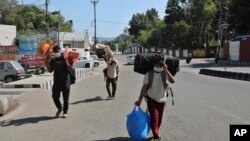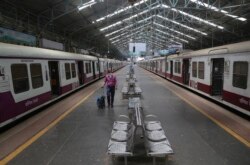India said Sunday it is locking down 75 districts across the country in an effort to contain the spread of COVID-19.
Authorities say the interstate bus service will be suspended until March 31.
India has 396 confirmed cases of the coronavirus and seven deaths, according to the Johns Hopkins Corona Virus Resource Center.
News of the lockdown comes after India had a nationwide, voluntary 14-hour lockdown Sunday.
The sound of silence descended on India as hundreds of millions hunkered indoors Sunday in response to a call by Prime Minister Narendra Modi to observe a voluntary 14-hour lockdown as a surge in coronavirus cases deepens worries about the pandemic in the world’s second most populous nation.
Authorities also shut down one of the world’s busiest rail networks and most public transport including metro trains and suburban train networks that are the lifeline in cities like Mumbai as the country steps up the fight against the virus.
Through the day, streets in India’s noisy and bustling were quiet. Vendors and hawkers who usually line roadsides did not set up stalls on a day billed as a “people’s curfew” and a symbolic display of national resolve rather than an outright ban.
The eerie calm only broke briefly at 5 pm when millions of citizens emerged on windows, doorsteps and balconies to clap, ring bells, sing and blow conch shells – a gesture that the prime minister had called for to show the nation’s appreciation for those providing essential services such as health care and sanitation. Those who joined in included top Bollywood stars.
“Today’s success may actually presage greater acceptance as we go along in the next few days,” says Professor Srinath Reddy, President of the Public Health Foundation of India. “It was to build social solidarity and public opinion in favor of necessary measures of discipline and sacrifice rather than diktats handed down.”
"The steps we take now will help in the times to come," Modi said in a tweet in the morning as he urged people to observe the “curfew.”
The lockdown from 7am to 9 pm is seen as an effort to prepare people for what India may face in the days and weeks ahead. A sharp spike in cases in the last two days has led to grim warnings from some public health experts that after Europe, India could emerge as the next hotspot for the epidemic.
It is also widely believed that these numbers may not reflect the actual spread of the respiratory infection due to limited testing that has been done so far.
Some states have already ordered near-total shutdowns including the northern state of Rajasthan and four cities in the western state of Gujarat.
The country’s rail network was shut amid fears that the trains could carry the coronavirus into the heart of the countryside as millions of migrant workers begin to leave cites after losing their livelihoods as businesses downsize and malls, restaurants and educational institutions shut down. India’s trains ferry 23 million passengers a day.
Even Mumbai’s suburban train network has closed its doors to the public until Wednesday -- only staff working to provide essential services will be allowed to use the trains. It will effectively shut down commerce in much of the city.
India faces many challenges in containing the pandemic -- its massive population, packed cities, overcrowded slums, a huge migrant population and an inadequate health infrastructure. And as summer looms, advise on washing hands frequently could be of little use to a vast population that struggles with chronic water shortages.
India began the battle early to insulate itself from the virus imposing restrictions from the worst hit countries, testing people from overseas for symptoms of the disease, and recently banning all international flights.
“We are in uncharted territory and we are at the moment in the upswing phase,” says Reddy. But pointing to the tightening steps such as shutting down the rail network, he says “there is hope we will not be seeing an upswing at the pace others have experienced and we may be able to get it to plateau off earlier.”





